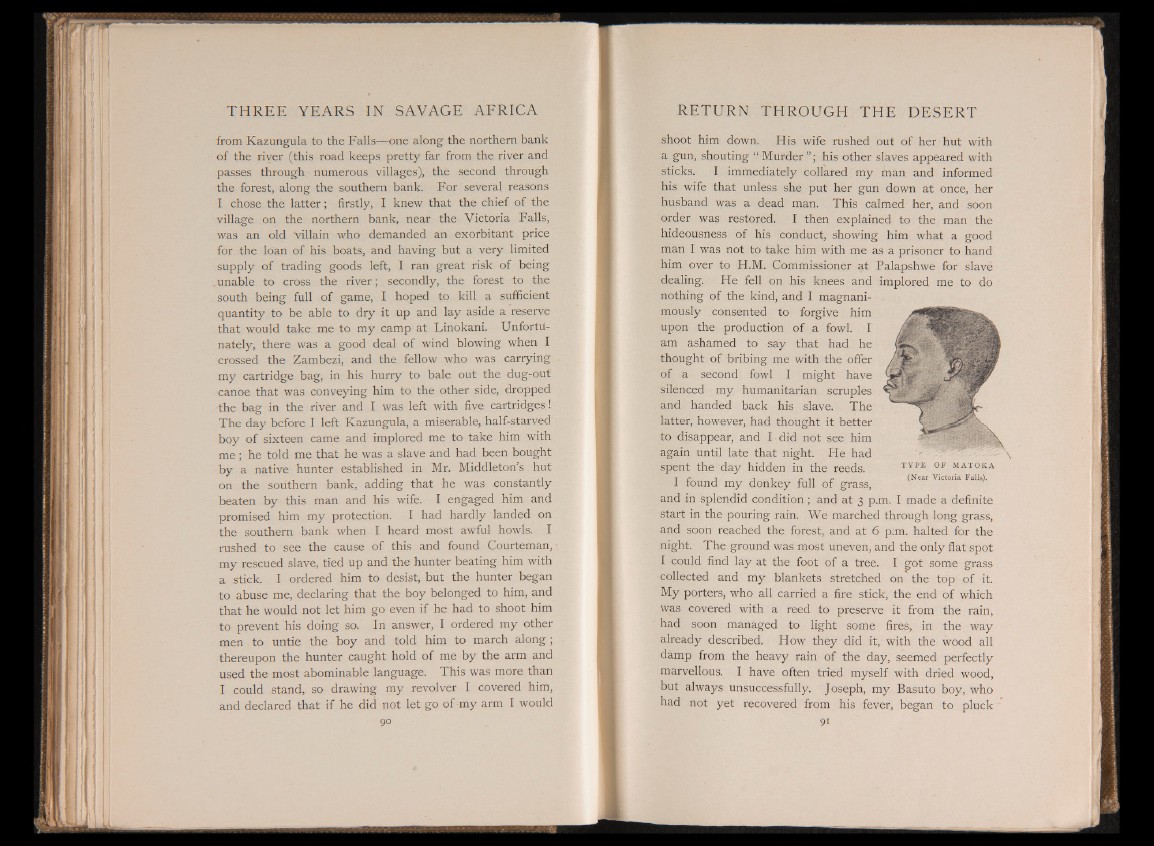
from Kazungula to the Falls—one along the northern bank
of the river (this road keeps pretty far from the river and
passes through numerous villages), the second through
the forest, along the southern bank. For several reasons
I chose the latter; firstly, I knew that the chief of the
village on the northern bank, near the Victoria Falls,
was an old villain who demanded an exorbitant price
for the loan of his boats, and having but a very limited
supply of trading goods left, I ran great risk of being
, unable to cross the river; secondly, the forest to the
south being full of game, I hoped to kill a sufficient
quantity to be able to dry it up and lay aside a reserve
that would take me to my camp at Linokani. Unfortunately,
there was a good deal of wind blowing when I
crossed the Zambezi, and the fellow who was carrying
my cartridge bag, in his hurry to bale out the dug-out
canoe that was conveying him to the other side, dropped
the bag in the river and I was left with five cartridges!
The day before I left Kazungula, a miserable, half-starved
boy of sixteen came and implored me to take him with
me; he told me that he was a slave and had been bought
by a native hunter established in Mr. Middleton’s hut
on the southern bank, adding that he was constantly
beaten by this man and his wife. I engaged him and
promised him my protection. I had hardly landed on
the southern bank when I heard most awful howls. I
rushed to see the cause of this and found Courteman,
my rescued slave, tied up and the hunter beating him with
a stick. I ordered him to desist, but the hunter began
to abuse me, declaring that the boy belonged to him, and
that he would not let him go even if he had to shoot him
to prevent his doing so. In answer, I ordered my other
men to untie the boy and told him to march along;
thereupon the hunter caught hold of me by the arm and
used the most abominable language. This was more than
I could stand, so drawing my revolver I covered him,
and declared that if he did not let go of-my arm I would
90
shoot him down. His wife rushed out of her hut with
a gun, shouting “ Murder ” ; his other slaves appeared with
sticks. I immediately collared my man and informed
his wife that unless she put her gun down at once, her
husband was a dead man. This calmed her, and soon
order was restored. I then explained to the man the
hideousness of his conduct, showing him what a good
man I was not to take him with me as a prisoner to hand
him over to H.M. Commissioner at Palapshwe for slave
dealing. He fell on his knees and implored me to do
nothing of the kind, and I magnanimously
consented to forgive him
upon the production of a fowl. I
am ashamed to say that had he
thought of bribing me with the offer
of a second fowl I might have
silenced my humanitarian scruples
and handed back his slave. The
latter, however, had thought it better
to disappear, and I did not see him
again until late that night. He had
spent the day hidden in the reeds. t y p e o f m a t o k a
t r i 1 1 r 11 r (Near Victoria Falls). I found my donkey full of grass,
and in splendid condition; and at 3 p.m. I made a definite
start in the pouring rain. We marched through long grass,
and soon reached the forest, and at 6 p;m. halted for the
night. The ground was most uneven, and the only flat spot
I could find lay at the foot of a tree. I got some grass
collected and my blankets stretched on the top of it.
My porters, who all carried a fire stick, the end of which
was covered with a reed to preserve it from the rain,
had soon managed to light some fires, in the way
already described. How they did it, with the wood all
damp from the heavy rain of the day, seemed perfectly
marvellous. I have often tried myself with dried wood,
but always unsuccessfully. Joseph, my Basuto boy, who
had not yet recovered from his fever, began to pluck